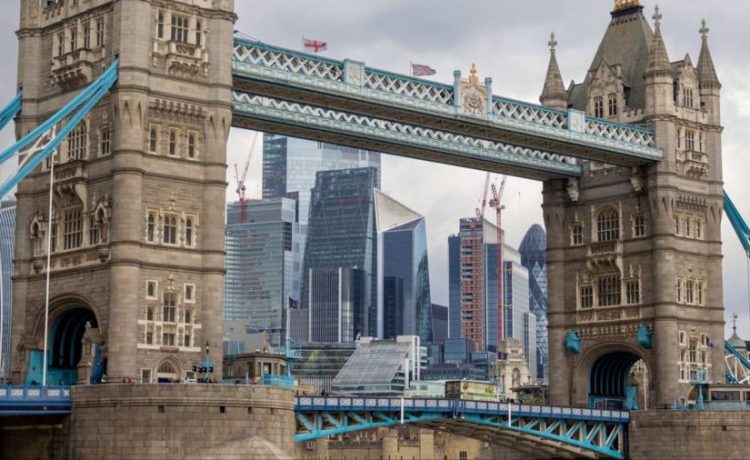One scoop to start: Two of the UK’s largest pension schemes, which together oversee £130bn in assets, will vote against the renewal of top directors at BP and Shell at their annual meetings unless both companies improve their commitments to tackling carbon emissions.
Welcome to FT Asset Management, our weekly newsletter on the movers and shakers behind a multitrillion-dollar global industry. This article is an on-site version of the newsletter. Sign up here to get it sent straight to your inbox every Monday.
Does the format, content and tone work for you? Let me know: harriet.agnew@ft.com
City bosses urge Hunt to boost pension capital into economy
We need to talk about London.
An influential group of City of London chief executives has called on Jeremy Hunt to enact reforms aimed at releasing more investor capital to support UK companies and boost the economy.
In a letter seen by the Financial Times, the UK Capital Markets Industry Taskforce (CMIT) told the chancellor there was a “substantial opportunity to deploy more long-term UK pension capital into the growth drivers of the UK economy, delivering better returns for savers and faster growth for the country”.
The letter from the group — which is chaired by Julia Hoggett, head of the London Stock Exchange — comes ahead of Hunt’s spring Budget on Wednesday and amid fears over the competitiveness of the UK stock market.
Technology group Arm and building materials giant CRH this month said they intended to list on the New York bourse, with other London-based companies drawing up plans to shift to the US following concerns over low valuations and liquidity.
Sir Nigel Wilson, head of the insurer Legal & General, warned last week that the long-term decline in equity investment by the pensions sector was a significant factor in companies’ “perpetual drift” away from London. He backed compelling DC schemes to invest in infrastructure and growth equity because otherwise, “it will take too long to change the whole culture in the UK”.
CMIT noted that support for UK assets by domestic pension schemes and insurers had “diminish[ed] at an alarming rate” to between just 5-6 per cent of their total investment into public and private companies.
In response, it called for a “swift consolidation of pension schemes in the UK, structural incentives for them to then deploy that capital into the UK and a renewed focus on returns rather than simply fees”.
Uniting often small defined benefit and defined contribution pensions in larger schemes could “develop the sophistication required to assess growth investment opportunities”, it said, adding that a starting point would be to consolidate the 86 local government pension funds in England and Wales.
The group — whose members also include Schroders chief Peter Harrison and Phoenix boss Andy Briggs — suggested that the Treasury consider tax exemptions to incentivise domestic investment.
CMIT said that if allocations in pension funds returned to the 25 per cent level they were at in 2007, between £847bn and £920bn of pension fund and insurer money would be generated to support to the UK economy.
Some have said defined contribution pension schemes should be made to invest a slice of their assets into early-stage companies.
Nicholas Lyons, the City’s Lord Mayor, said last month that he had held talks with the Treasury about forcing pension funds to invest 5 per cent of every single DC pension in a proposed £50bn growth fund. He estimates that there is a pensions pool of about £2tn to draw on.
Meanwhile UK equity fund managers, including Jupiter’s Richard Buxton and Newton Investment Management’s David Cumming are calling for an overhaul of pension accounting rules. They want a two-decade-old rule requiring companies to hold pension deficits on their balance sheets to be swiftly removed.
How can more pension fund capital be channelled into the UK economy? Email me: harriet.agnew@ft.com
A resurgence of global macro
Hedge funds are building their firepower in global macro trading as they seek to capitalise on the most lucrative environment since the financial crisis.
Macro trading, a decades-old strategy made famous by the likes of George Soros and Louis Bacon, involves betting on moves in global bonds, currency and other assets, writes Laurence Fletcher in London.
After years of dull returns in markets dominated by central bank stimulus, the sector has been turbocharged by sharp cuts in interest rates during the coronavirus pandemic and then the return of high inflation and steep rate rises as economies opened up.
US-based Schonfeld, Graham Capital and ExodusPoint are among firms hiring in this space. Managers are preparing for an expected influx of capital from investors searching for ways to protect their portfolios in an environment of choppy markets and diminishing support from central banks.
“There’s been a paradigm shift in interest in macro from the previous decade to now, due in large part to central bank activity,” said Kenneth Tropin, chair of $17.5bn-in-assets Graham Capital, which he founded in 1994. “Macro markets have been moving like crazy, last year was particularly good and the opportunity set is fantastic looking ahead.”
Demand for macro traders is “exceptionally high, both in quant and discretionary”, said one hedge fund recruiter.
One of the oldest hedge fund strategies, macro hedge funds struggled for years as trillions of dollars of central bank stimulus suppressed market volatility and pushed interest rates to near zero, limiting their ability to profit.
But they have largely enjoyed a revival since the start of the pandemic, with many such as Caxton Associates and Brevan Howard profiting handsomely as interest rates were slashed in 2020 in a bid to revive economic growth.
Chart of the week

UK pension funds are poised to further reduce their support for the London stock market as employers accelerate a push to lock in higher bond yields and offload tens of billions of pounds of liabilities to insurers.
Industry executives said 2023 is set to be a record year for such transfer deals for defined benefit pension schemes, which promise to pay employees’ retirement payments at a fixed level. Rising interest rates have boosted these plans’ funding levels to their highest in more than a decade.
This year is on track to far exceed the previous peak of £44bn in liabilities transferred in 2019. Phoenix Group, one of the UK’s largest savings and retirement businesses, estimates £60bn in liabilities will be shifted to insurers this year, with important implications for asset allocation.
“The optimal assets to transition to an insurer is fixed income,” said Mike Eakins, chief investment officer at Phoenix. “That’s been a key strategic driver” of a shift out of UK equities, which is set to continue as pension schemes prepare their balance sheets for insurers, he added.
In this column, Lex argues that while the expected uptick in transfer deals might weigh heavily on the London stock market, there are potential gains for all sides: sponsors, members and insurers.
Five unmissable stories this week
Silicon Valley Bank: inside the spectacular unravelling of the tech industry’s banker. While its rapid collapse has stunned the venture capital and start-up community, its fate had been sealed almost two years earlier.
Cathie Wood’s Ark Investment Management has earned more than $300mn in fees on its flagship exchange traded fund since its inception nine years ago, while wiping out almost $10bn of investors’ cash in the same period.
The number of investment products has proliferated to the point that they are confusing retail investors, top asset management executives from T Rowe Price, Invesco and State Street Global Advisors have said in a warning for the industry.
M&G’s chief executive Andrea Rossi said the business “has what it takes” to push ahead as a standalone company amid speculation of a takeover approach from Australian group Macquarie.
Private credit groups including Apollo, Ares and Blackstone are poised to write the largest direct loan on record as they continue to muscle in on a lucrative business traditionally dominated by Wall Street banks.
And finally
I’m late to the party but last week I finally went to see Sam Mendes’s magnificent 2018 staging of the Lehman Trilogy, which has returned to London’s West End post-Covid. It’s as much the story of modern America and modern capitalism as it is the tale of how a tiny 19th-century fabric shop founded by three Bavarian-Jewish brothers in Montgomery, Alabama, later moved into commodity dealing and then to finance, before coming crashing down in 2008. It’s an extraordinary performance — catch it at the Gillian Lynne Theatre before it closes.
FT Live event: Future of Asset Management Asia
The Future of Asset Management Asia is taking place for the first time in-person on 11 May at the Westin Singapore and will bring together Asia’s leading asset managers, service providers and regulators including, Asian Development Bank, The Stock Exchange of Thailand (SET), Allianz Global Investors and many more. For a limited time, save up to 20 per cent off on your in-person or digital pass and uncover the industry’s top trends and opportunities. Register now
Thanks for reading. If you have friends or colleagues who might enjoy this newsletter, please forward it to them. Sign up here
We would love to hear your feedback and comments about this newsletter. Email me at harriet.agnew@ft.com





